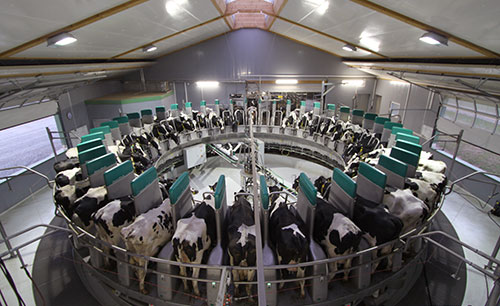
by Amanda Smith, Associate Editor
Years have been devoted to studying cows' time budgets. In much the same vein, the farm as a whole also has a time budget; the majority of which is devoted to milking cows. And, with any job that is labor intensive, automation often follows.
"For a cow, the best thing we can provide is a consistent milking procedure," noted Steve Pretz, vice president of large project sales, at GEA's Automation Day 4.0 in Teichroda, Germany. Improved efficiency, consistency and a lesser dependence on labor were highlighted often, as GEA staff discussed its robotic rotary parlor, DairyProQ, and enabled event attendees to see it in action.
For a cow, the good life is a boring life; both repetition and consistency are essential to creating the environment our cows crave. Producers from both dairies we visited noted that the robotic rotary provides a level of milking routine consistency that is otherwise unachievable.
Affordable labor, and in some regions of the world reliable labor, is becoming more difficult to source. In the future, labor availability will likely be a driving factor behind the system's adoption. "In terms of both availability and cost, labor is the problem," noted Pretz.
To date, there are four robotic rotary parlors operating in Germany. An additional unit has been sold there, along with two in Canada, stated Thomas Mader, director of automated dairy applications.
The robotic rotary ranges between 28 and 80 stalls; enabling producers to milk between 120 and 400 cows per hour, depending on the herd's size. All of the unit's components have been integrated into the rotary's stainless steel stall dividers. While in-liner predipping is prohibited in the European market, in North America, predipping and postdipping will take place in the unit's liner.
"The technology is ready to be applied, but it is the farmer's choice if they go with an automated milking system or a traditional parlor. Their management skills and comfort level with technology are key factors for success," added Kees de Koning, with Wageningen University in the Netherlands.
(c) Hoard's Dairyman Intel 2015
June 22, 2015








